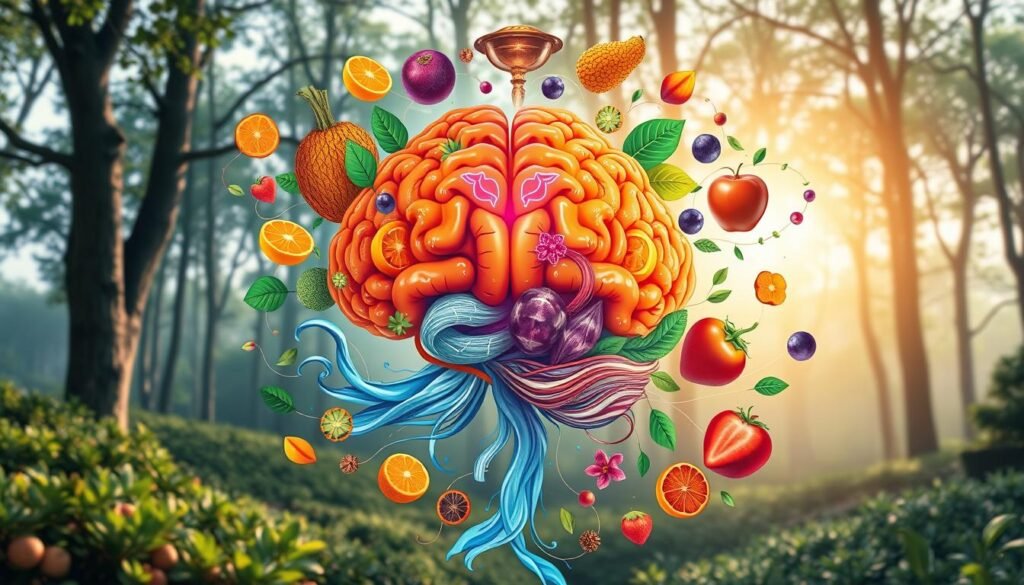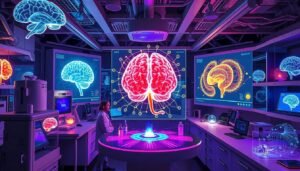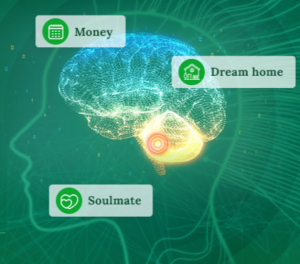
Wendy Suzuki, PhD, is a leading neuroscientist at New York University. She’s uncovering the brain’s amazing abilities and how lifestyle choices can boost its performance. Her research dives into the brain’s neural pathways and cognitive functions, revealing secrets to better brain health and mental enhancement.
The neuroscience field is growing fast, with the market expected to hit $41 billion by 2031. Suzuki’s work is more important than ever. She’s exploring new ways to improve brain function, helping people take charge of their mental health and reach their full potential.

Key Takeaways
- Discover the power of lifestyle choices in enhancing cognitive function and reducing dementia risk.
- Explore the latest scientific breakthroughs in understanding neural pathways and neuroplasticity.
- Learn how to incorporate proven practices like sleep, meditation, exercise, and nutrition into your daily routine for optimal brain health.
- Understand the crucial role of social connections in building neural resilience and promoting longevity.
- Gain insights into the future of neuroscience and innovative treatments for neurological disorders.
Scientific Breakthroughs in Brain Health Research
Neuroscience has seen huge progress lately. It’s uncovering the brain’s secrets and how it works. This includes new insights into how we think and learn.
Understanding Neural Pathways and Cognitive Function
A big study funded by the NIH looked at 84 brains. They used new tools to study brain cells. This helped us understand how our brains work better.
Latest Discoveries in Neuroplasticity
Neuroplasticity is a key area in neuroscience. It’s how our brains change and adapt. This is important for mental health and new treatments like hypnotherapy.
Impact of Modern Neuroscience on Brain Health
Neuroscience has changed how we see brain health. It’s helping us find new ways to improve our minds. This includes better ways to focus and think faster.
“The brain is the last and greatest biological frontier, the most complex thing we have yet encountered in our universe.” – James D. Watson, co-discoverer of the DNA double helix
As neuroscience keeps growing, we’re learning more about our brains. This knowledge will change how we think and feel. It’s leading to a brighter, more focused future.
PhD Neuroscientist Reveals Revolutionary Daily Practices
Dr. Wendy Suzuki is a top neuroscientist who has spent her career studying the brain. She shares a daily routine that boosts cognitive insights and brain health. This routine is based on her research and personal experiences.
Dr. Suzuki starts her day with 8 hours of sleep. She believes sleep is key for making new discoveries and using the latest brain technology. She wakes up between 5-5:30 AM. She uses making morning tea as a way to meditate and get ready for the day.
- Then, she does 30 minutes of cardio to improve her brain health.
- She also values strong social connections. Studies show they help us live longer and lower our risk of dementia.
Good nutrition is also important in Dr. Suzuki’s routine. She eats a Mediterranean diet full of whole grains, fruits, veggies, and lean proteins. These foods help keep her brain sharp and healthy.
“The key is to create a holistic lifestyle that nourishes the brain on multiple levels – from sleep and exercise to social engagement and mindful nutrition. These daily practices can truly transform our neurological well-being.”
Dr. Wendy Suzuki encourages people to follow her daily habits. She believes they can help improve brain health and unlock our full potential.
The Power of Sleep in Cognitive Enhancement
Quality sleep is key for our brain health and thinking skills. Neuroscientists say getting enough sleep can boost memory, prevent dementia, and improve brain function over time.
Optimal Sleep Duration for Brain Health
Experts suggest 7-9 hours of sleep each night for better thinking. Sleeping less than 5-6 hours can raise dementia risk by 30% to 100% compared to those sleeping 7-8 hours. Keeping a regular sleep schedule is vital for energy, productivity, and brain health.
Sleep’s Role in Dementia Prevention
Sleep helps move memories from the hippocampus to the cortex, keeping them safe. If this process is disrupted, it can make it hard to form new memories and keep old ones, a sign of dementia.
Creating an Effective Sleep Schedule
- Establish a consistent sleep-wake routine, aiming to go to bed and wake up at the same time each day.
- Create a sleep-conducive environment by keeping the bedroom cool, dark, and quiet.
- Limit screen time and exposure to blue light before bedtime to promote melatonin production.
- Engage in relaxing activities like reading, gentle yoga, or meditation to wind down before sleep.
- Avoid caffeine, heavy meals, and stimulating activities in the hours leading up to bedtime.
By focusing on quality sleep and a good sleep schedule, we can unlock our brain’s full potential. This helps fight neurodegenerative diseases and boosts brain function through exploring our mindscape and optimizing neural pathways.
“Sleep is the golden chain that ties health and our bodies together.” – Thomas Dekker
Meditation and Mindfulness Impact on Neural Networks
Recent studies show how meditation and mindfulness change our brain networks. These old practices boost our thinking, emotions, and self-awareness. All these are key for a healthy brain.
A study at the University of California San Diego found meditation relieves pain. It was better than a placebo or fake meditation. Brain scans showed it changed how our brain handles emotions and self-awareness.
Another study showed meditation’s long-term benefits. People who meditated daily for 4 weeks felt better. They were more mindful and less anxious. This shows meditation can change our brain for the better.
“Mindfulness meditation has the ability to rewire our neural pathways, enhancing cognitive function and emotional resilience – two key pillars of brain health.”
Meditation and mindfulness work on parts of the brain that control emotions and thinking. This helps our brain adapt and improve. It makes us better at remembering, focusing, and making decisions.
As scientists learn more about the mind and body, meditation’s benefits are clear. Adding these practices to our lives can make our brains work better. It’s a step towards being smarter and healthier.
Exercise and Brain Function Connection
Leading neuroscientists have found a strong link between exercise and brain health. PhD neuroscientist Wendy Suzuki says regular exercise boosts brain function. This helps us think, learn, and remember better.
Aerobic Exercise Benefits for Memory
Suzuki’s studies, with over 10,000 participants, show exercise’s brain benefits. Just 10 minutes a day can improve brain function. Activities like brisk walking or dancing help grow memory-making areas in the brain.
Strength Training’s Impact on Cognitive Health
Suzuki also talks about strength training’s cognitive benefits. She found that mixing cardio and strength exercises daily improves brain and bone health. This can lower the risk of diseases like Alzheimer’s.
Optimal Exercise Routines for Brain Enhancement
Suzuki suggests a mix of aerobic and strength training for best results. Aim for three to four 30-minute workouts weekly. This routine boosts brain health, improving memory and focus.
“The comprehensive imaging scans highlighted the interconnected synergy between physical activity and brain health. The research underlines the benefits of exercise in maintaining brain size and reducing the risk of dementia.”
Suzuki’s research shows exercise’s huge impact on brain health and function. By adding these exercises to our daily routine, we can improve our mental abilities and well-being.
Nutrition Strategies for Optimal Brain Performance
At the forefront of cutting-edge neuroscience insights, we uncover the transformative power of nutrition in unlocking the secrets of brain health and mental agility. By harnessing the principles of neuroplasticity, we can optimize our brain function and propel ourselves towards a future of cognitive excellence.
The Mediterranean diet is a standout dietary approach, championed by our PhD neuroscientist. It’s a plant-based regimen, rich in whole grains, fruits, vegetables, and lean proteins high in omega-3 fatty acids. This diet has been extensively studied for its remarkable brain-boosting effects.
Studies show that this diet not only aids in weight loss and heart health but also significantly promotes longevity. It supports cognitive function and prevents neurodegeneration.
The emphasis on omega-3 fatty acids, particularly DHA and EPA, is a crucial component of the Mediterranean diet’s brain-nourishing prowess. These essential fats play a vital role in maintaining neural pathways, enhancing synaptic plasticity, and supporting overall brain structure and function.
Our neuroscientist also highlights the importance of incorporating other key nutrients into our daily routines. Fiber-rich foods, such as leafy greens, have been associated with fewer memory problems and slower cognitive decline. Consuming adequate amounts of antioxidants, like those found in dark chocolate and red wine, can help combat oxidative stress and protect our neural networks.
Proper hydration is another crucial factor in optimizing brain performance. Since the brain is composed of 80% water, even mild dehydration can lead to symptoms such as fatigue, dizziness, and confusion. Maintaining a consistent, adequate water intake is essential for supporting cognitive function and overall brain health.
By embracing these evidence-based nutrition strategies, we can unlock the true potential of our brains. We embark on a journey of neuroplasticity, mental agility, and enhanced cognitive capabilities. Join us in this transformative exploration of the brain-body connection and unlock the secrets to lifelong brain health.

“Proper nutrition is the foundation for a thriving brain. By nourishing our minds with the right foods, we can unlock the full potential of our cognitive abilities and enhance our mental performance.”
Social Connections and Cognitive Health
Keeping strong social bonds is key for our brain health and living longer. Studies show people with many friends have a 26% lower risk of getting dementia. As a top neuroscientist, I stress the need for deep connections in our brain health plan.
Building Neural Resilience Through Relationships
Talking to others boosts our brain functions and mental health. Our brains react to social rejection like physical pain, showing how important friends are for our minds.
Also, feeling valued at work makes our brain’s reward system light up, like money does. This shows how crucial social praise is for motivation and happiness.
Social Interaction’s Impact on Longevity
- Research finds adults over 65 with lots of friends see a 39% slower cognitive decline over 5 years compared to those with few friends.
- People with high cognitive reserve can stay mentally sharp even with Alzheimer’s disease.
- The Social Networks in Alzheimer Disease (SNAD) project found diverse social networks can lessen the bad effects of brain changes on social thinking.
By caring for our social ties, we strengthen our brain’s resilience and support our cognitive health. Valuing relationships is a vital part of keeping our minds sharp and healthy.
Understanding Neurodegeneration and Prevention Methods
Our team is at the forefront of neuroscience, working to understand neurodegeneration and find ways to prevent it. As people get older, this issue becomes more urgent. Alzheimer’s treatment costs in the US are expected to jump from $305 billion to $1 trillion by 2050.
But there’s hope. New drugs, gene therapy, and better diagnostic tools like PET scans are changing the game. Research on traumatic brain injury also offers insights into neurodegenerative diseases.
To fight neurodegeneration, we need a broad approach. Our work in mind-body secrets and memory techniques, along with neuroplasticity discoveries, is key. These areas hold promise for prevention and treatment.
| Statistic | Implication |
|---|---|
| Alzheimer’s disease is the most common primary cause of dementia. | Underscores the urgent need to address this debilitating condition. |
| Around half of people with Down syndrome will develop Alzheimer’s disease as they age. | Highlights the importance of understanding the genetic and developmental factors underlying neurodegeneration. |
| Aging, genetic predisposition, obesity, metabolic syndrome, cerebrovascular disease, neuroinflammation, head trauma, and environmental exposures have been hypothesized to play etiologic roles in Alzheimer’s disease. | Emphasizes the multifaceted nature of Alzheimer’s disease and the need for a comprehensive approach to prevention and treatment. |
We’re committed to pushing neuroscience forward. Our goal is to understand neurodegeneration and find prevention methods. This will help us create a healthier, more resilient future.

“At Duke, our groundbreaking research and collaborative efforts are paving the way for a deeper understanding of neurodegeneration and the development of transformative prevention strategies. By harnessing the power of mind-body connection secrets and the latest memory enhancement techniques, we are confident in our ability to make a profound impact on the lives of those affected by these debilitating conditions.” BUY OFFICIAL WEBSITE
Breakthrough Treatments in Neuroscience
The field of neuroscience is seeing big changes. It’s unlocking the secrets of ur brains and leading to new treatments. Researchers are finding new ways to improve brain health and solve big cognitive challenges.
Innovative Approaches to Brain Health
One exciting find is a potential new treatment for addiction and pain. Scientists found a brain pathway linked to social aversion in opioid withdrawal. This could lead to new pain meds and ways to prevent addiction relapse.
Hypnotherapy is also showing promise for improving the brain. It uses neuroplasticity to change thought patterns and emotions. This natural method could reveal mental health revelations and cognitive enhancement secrets in our brains.
Future of Neuroscience Therapies
The future of brain treatments looks even brighter. Research shows knocking out certain genes can help brain cells grow in mice. This could lead to new treatments for diseases like Alzheimer’s and Parkinson’s, and help with brain injury recovery.
Scientists also found other brain pathways that could lead to new treatments. These pathways could help with stem cell growth and function. This opens up new possibilities for treating the brain and improving neural pathways unlocked and memory mastery unveiled.
As we learn more about the brain, neuroscience therapies will change how we handle brain health and mental well-being. The future is full of hope for better brain treatments. BUY OFFICIAL WEBSITE
Conclusion
Neuroscience research, daily habits, and new therapies offer a complete way to keep our brains healthy. PhD neuroscientist Wendy Suzuki shares how daily routines and neuroscience breakthroughs are changing brain care. By focusing on sleep, meditation, exercise, and good nutrition, we can improve our brain health.
Studies like the Adolescent Brain Cognitive Development (ABCD) Study are helping us understand the brain better. They show how lifestyle affects our brain’s development. This knowledge helps us find ways to boost mental performance accelerated at any age.
The future of neuroscience is exciting, with new discoveries and treatments on the horizon. This approach helps us take care of our brains and reach our full potential. The insights from this article guide us towards a brighter, more vibrant future for our minds.